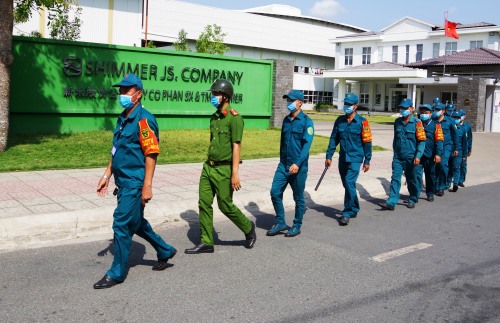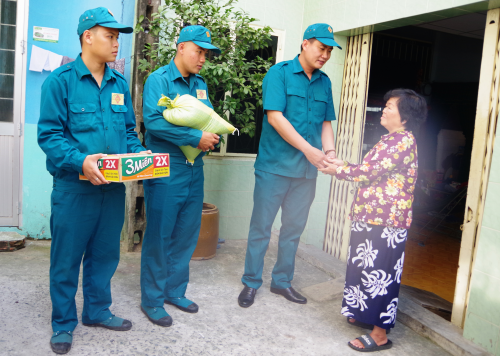Long An province enhances law dissemination and education for militia and self-defence forces
Long An is a border province located in the southern key economic region and the link between the Southeastern and the Southwestern regions. It holds an important position in many aspects, especially in terms of national defence and security in the overall defence posture of Military Region 7. Fully aware of the circumstances of the locality and thoroughly grasping and seriously implementing resolutions and directives of the Party, the Central Military Commission, the Ministry of National Defence, directly Military Region 7 and the Provincial Party Committee on military and defence tasks, Long An has paid special attention to the development of the militia and self-defence forces to make it appropriate in proportions and structures, and capable of successfully carrying out military and defence tasks. In particular, improving the awareness of law enforcement, disciplining, and practical operational capacity of the militia and self-defence forces is considered the most important to create a clear change in the awareness of law obedience, the sense of self-discipline for this important force, thereby, contributing to improving the its overall quality, especially the political quality, making it worthy of being the core force in maintaining political stability, order, and social safety right from the grassroots level, creating favourable conditions for the province’s fast and sustainable development.
 |
| Self defence force of Trung Thanh company, Can Duoc district on patrol |
Promoting the responsibility of party committees, leaders, and commanders of localities, agencies, and businesses for the work of law dissemination and education is an important and decisive issue in raising awareness of law obedience, disciplining, and practical operational capacity of the militia and self-defence forces. To achieve high efficiency, the Military Party Committee and the Provincial Military Command direct military agencies of districts, cities, and towns to actively and proactively coordinate with agencies, departments, and branches to advise party committees at the same level to strengthen the grasp of the above directives and instructions on the work of law dissemination and education through conferences, briefings, training, and contests, etc. As a result, the awareness of party committees and leaders of localities, and militia and self-defence units about this work has been increasingly enhanced; there has been much attention being paid to the work of strengthening the Council for Law Dissemination and Education, and more investments have been made in the facilities, etc. At the same time, the role of the Council for Law Dissemination and Education in assessing the current state of law enforcement by militia and self-defence forces has been promoted, as a basis for selecting dissemination and education contents that are focused and suitable for practice; the content, form, time, and subjects of dissemination and education are determined specifically, scientifically and promptly deployed to agencies and units; the evaluation of performance has been seriously carried out, completely avoiding the phenomena of formalities, fake achievements, and the omission of content.
Improving the operational quality of the political and legal reporters for militia and self-defence forces. This staff are mainly junior political commissars and deputy junior political commissars of the military commands of communes, wards, towns, agencies, and businesses. They have to provide comprehensive direction of activities of localities, agencies, and businesses, while conducting party work and political work in the militia and self-defence force, so they sometimes fail to pay due attention to researching content and practicing dissemination skills. For this matter, the Provincial Party Committee and Military Command advocate improving skills and pedagogical methods for this staff. In terms of skills, political agencies at all levels, especially district levels, review and evaluate the true quality of political teaching staff and legal reporters; coordinate with the Council for Law Dissemination and Education to determine the content of training and fostering skills in drafting lesson plans, lectures (electronic lectures), and legal dissemination outlines; the way to collect documents, evidence, illustrations (images, video clips) appropriate to each content, etc. Thereby, the content of legal dissemination and education has not only met the requirements in terms of knowledge volume, but also completely overcomes the sketchy lectures which lack of supporting content, making it difficult for learners to understand. On the other hand, it helps make the teaching of legal topics flexible, rich, effective, and not dry or boring. Moreover, the Provincial Military Command also focuses on fostering and improving the ability to apply the methods of interpretation, analysis, dialogue combined with PowerPoint presentations,... in the practice of political education in general, and in law dissemination and education in particular, to make the process scientific, understandable, memorable, and feasible.
 |
| Militia of the province help the poor |
Innovating the content and forms of propaganda and dissemination of education and laws. This is the most important solution in improving the awareness and actions of the militia and self-defence forces in law obedience, because legal contents are dry, difficult to understand and difficult to convey. Therefore, the Provincial Military Command requests military agencies of districts, cities and towns to determine the content of legal dissemination and education in a comprehensive and focalised manner. At the same time, they are required to apply a variety of forms and methods tailored for each subject, focusing on laws, decrees, and circulars related to the activities of militia and self-defence forces participating in military and national defence activities, crime combat, search and rescue, etc. During the implementation process, the reporters are required to focus on ideological orientation and action guidance; relate the contents to the functions and tasks of the targeted learners, thereby building and raising the awareness of law observance and the sense of self-discipline of militia and self-defence forces in daily life and work, especially in carrying out local and grassroots military and defence tasks. In terms of form, law dissemination and education is conducted in clusters of communes, wards, towns, and self-defence units, or in task forces by junior political commissars of militia and self-defence units. Actively coordinate with the Council for Law Dissemination and Education, the Police, the Courts, and the Procuracy of districts, cities, and towns to disseminate new and important topics that influence the awareness, responsibilities of militia and self-defence forces in their task performance. At the same time, the situation of law violations is informed in the form of documents in activities, studying, and task performance. Besides, the models, such as: "Each week learn a legal document in the armed forces of districts, cities and towns", "Each week spend 01 hour on studying and researching 01 related legal document to local military and defence work" are implemented well.
In order to make the contents interesting, the Provincial Military Command encourages the districts, cities and towns to hold legal contests on the stage; encourages the forces to participate in the " Internet-based legal Contest", the writing contest about "the Constitution of the Socialist Republic of Vietnam"; integrate legal propaganda in cultural and artistic performances in localities, agencies and businesses; propagate typical individuals and the examples of "good people, good deeds" on the newspapers and radio of the Military Region, the Province, the districts, cities and towns. At the same time, legal dissemination and education is combined with effective implementation of local emulation programmes and movements, such as: building new rural areas; hunger eradication and poverty reduction; joining hands for the poor – leaving no one behind; the youth pioneering in Fatherland protection,...). Thereby, the amount of legal information provided to the militia and self-defence forces is increasingly rich and profound, creating a clear change in the awareness of obeying the State law, regulations of localities, agencies and enterprises. This is evidenced by the fact that normal disciplinary violation rate is kept at less than 0.3%, and no case of serious disciplinary violations is recorded.
The above results are attributed to the right direction, practical and effective solutions of the Provincial Military Command. In the coming time, it will continue to further enhance law dissemination and education for militia and self-defence forces. At the same time, it will request district-level military command to direct militia and self-defence units to advise local party committees, authorities and leaders and heads of agencies and businesses to invest more in facilities and means for the work of law dissemination and education, to raise the awareness, sense of observing law, discipline and practical operational capacity of the militia and self-defence forces, contributing to the successful implementation of the national defence and local military tasks, and the nonstop development of Long An province.
Senior Colonel LE MINH TRUNG, Political Commissar of the Provincial Military Command